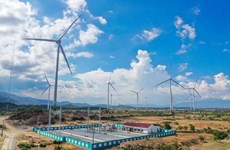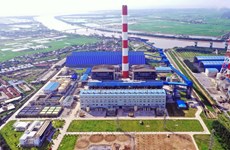FDI enterprises believe in ‘new normal’ business environment
Hanoi (VNA) – FDI businesses attending a high-level session of the Annual Vietnam Business Forum (VBF) 2022 on February 21 spoke highly of the Vietnamese Government’s measures to control COVID-19 and maintain stable production and business activities.
 At the high-level session of the Annual Vietnam Business Forum (VBF) 2022 on February 21 (Photo: VNA)
At the high-level session of the Annual Vietnam Business Forum (VBF) 2022 on February 21 (Photo: VNA)They also showed their optimism and trust in Vietnam’s trade and investment environment under the ‘new normal’.
Greater business confidence
Alain Cany, Chairman of the European Chamber of Commerce in Vietnam (EuroCham), said more than 1,200 EuroCham members are more optimistic about the prospects of their own enterprises in the post-pandemic new normal, as reflected by the Business Climate Index (BCI) increasing from 42 to 61 points in January 2022.
2021 also marked one year of the implementation of the EU-Vietnam Free Trade Agreement (EVFTA), with the elimination of almost 99% of tax lines. Even during the COVID-19 pandemic, the EVFTA still met the expectations of the two sides.
According to Alain Cany, last year bilateral trade between the EU and Vietnam increased by 14.8%, reaching about 63.6 billion USD.
As COVID-19 has been gradually brought under control, with EVFTA taking effect and the EU-Vietnam Investment Protection Agreement (EVIPA) soon to be implemented, Vietnam has the opportunity to attract a new wave of FDI from European investors who are looking for a potential, safe and competitive investment environment. EuroCham welcomes the Vietnamese Government's efforts in promulgating, amending and simplifying several regulations to bring them in line with the provisions of the EVFTA, he said.
Representing more than 650 businesses and 2,500 individuals, John Rockhold, Chairman of the American Chamber of Commerce in Vietnam (AmCham), also said that the chamber members are optimistic about the prospects of reopening and economic recovery and development of Vietnam.
Appreciating the Vietnamese Government's recent decisions to facilitate cross-border travel, he recommended additional actions be taken to ease the burden on international travel, for both foreigners and Vietnamese citizens. In particular, procedures need to be handled more quickly for executives, new investors and technical support teams, so that businesses can maintain operations and expand investment, he said.
John Rockhold emphasized the importance of a fair, transparent, predictable and rational legal framework to facilitate investment, as well as maintain and develop supply chains. This is not only to attract new investments but also to maintain and grow existing ones.
Improving financial situation and cash flow
Echoing John Rockhold, Chairman of the Japan Business Association in Vietnam Inoue Soichi expects that the country will continue to implement the policy of 'living with COVID-19' to achieve high economic growth in 2022, under the leadership of the Prime Minister.
He proposed the Government still play an essential role in improving the financial situation and cash flow when the economy recovers.
The Government has flexibly managed foreign currency loans of domestic financial institutions in Vietnam while accelerating the digital transformation process and streamlining paperwork in the financial-banking sector, as well as in tax and customs agencies nationwide.
Meanwhile, Nitin Kapoor from the British Chamber of Commerce in Vietnam (BritCham), said that Vietnam needs to learn from other countries’ experience and actions to maximize efficiency and speed up recovery, ensuring the country does not fall behind when reopening the economy.
Established in 1997, VBF is a regular and high-level channel of communication between the business community and the Vietnamese Government.
The high-level session of the VBF 2022, themed “Restoring the economy & developing supply chain in the new normal”, discussed Vietnam’s economic issues including improving business conditions and roles and responsibilities in developing sustainable supply chains, and identification of local and foreign businesses in supply chains.
It was organized by the Ministry of Planning and Investment (MPI) in collaboration with the World Bank and the International Finance Corporation (IFC)./.











